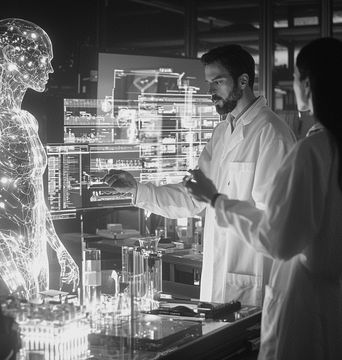GOOGLE'S AI 'CO-SCIENTIST' SOLVES DECADE-LONG SUPERBUG PROBLEM IN 48 HOURS!

In an unprecedented and potentially game-changing feat, Google’s artificial intelligence (AI) tool known as a ‘co-scientist’ has successfully resolved a superbug problem in just two days—a task that had, until now, preoccupied scientists for a decade. Designed to make sense of how superbugs develop resistance to antibiotics, the AI tool's impressive show of intelligence opens up massive potential for the future of scientific research. Simultaneously, it also lends fuel to the continuing debate around the ethical implications of integrating AI into scientific processes.
The AI triumph, spearheaded by José Penadés and his team at Imperial College London, unfolded without the tool having prior access to their crucial research. Nevertheless, the AI managed to provide results consistent with the team's unpublished findings, essentially correlating a decade worth of work in two short days. It’s a revelation that could definitively revolutionize the pace at which scientific advancements are achieved and begs a larger question: Can AI, in fact, outsmart humans in posing the pivotal questions that design our experiments?
Antimicrobial resistance (AMR)—the process through which infectious microbes learn to resist antibiotics—killed an estimated 1.27 million people globally in 2019 alone. It is among the most serious and deadly health threats we face on a global scale. In this context, the potential of AI to expedite the pace of scientific research could be groundbreaking. Could the integration of AI into our scientific research processes signal the beginning of a new age of discovery, marked by rapid identification and resolution of global health threats?
While the AI's success provides a glimpse into this promising future, it also opens a Pandora’s Box of ethical quandaries. For instance, what happens if the AI's results are incorrect but receive no critical assessment because of the allure of their speed and the AI’s high-stakes reputation? What are the implications if AI reproduces research inaccurately?
To avoid these thorny issues and potential backlash, the accuracy and reproducibility of AI-assisted research need to be critically assessed and its findings peer-reviewed. As with all human research, AI tools should be compelled to adhere to stringent ethical guidelines to ensure the integrity of the scientific process.
In conclusion, while the AI tool's potential to benefit scientific research and speed up discovery is undeniable, it requires careful implementation and ongoing scrutiny to minimize ethical concerns. This tandem use of AI and humans: the 'co-scientist' presents a novel and potent avenue in the field of scientific research that, when properly harnessed and held to the highest ethical standards, might just usher in a revolution, the likes of which we’ve never seen. It's a development that reflects the essence of our times: remarkable, promising, controversial, and utterly fascinating.